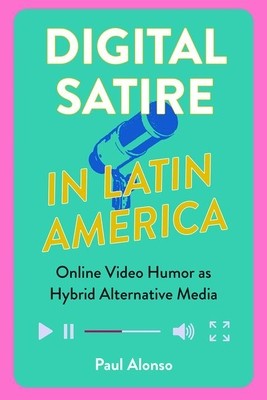
- We will send in 10–14 business days.
- Author: Paul Alonso
- Publisher: University of Florida Press
- ISBN-10: 1683404637
- ISBN-13: 9781683404637
- Format: 15.2 x 22.9 x 1.6 cm, kieti viršeliai
- Language: English
- SAVE -10% with code: EXTRA
Reviews
Description
How creators of online video critique politics and society and amplify public discourse in Latin American countries
This
book analyzes how digital-native audiovisual satire has become
increasingly influential in national public debates within Latin
America. Paul Alonso illuminates the role of online video in filling
gaps in sociopolitical critique left by television, traditional
journalism, and commercial entertainment while exposing some of the
prevalent tensions of the region.
Alonso draws on
interviews and analyzes media content to consider some of the most
representative and influential satirical shows born on the internet and
produced in Argentina, Colombia, Ecuador, Peru, Mexico, and Latinx
communities in the United States. He discusses YouTubers Chumel Torres,
Malena Pichot, Guille Aquino, Joanna Hausmann, and El Cacash; the
Enchufe.tv collective; and the video columnists Maria Paulina Baena from
La Pulla and Mariángela Urbina from Las Igualadas. These creators use
professional and non-mainstream practices and resources to dismantle
fake news, highlight social tensions, and offer in-depth content that
goes beyond confrontational attacks.
In contexts of
highly ideological polarization, Alonso argues, digital satire is a
unique type of hybrid alternative media that can articulate nonpartisan
interpretations of reality while also questioning, deconstructing, and
subverting the authoritative role of media. Satiric voices can offer an
informed, reflexive, argumentative, or historically rooted perspective
that amplifies public discourse and shapes changing notions of
journalism and political communication in democratic societies.
A
volume in the series Reframing Media, Technology, and Culture in
Latin/o America, edited by Héctor Fernández L'Hoeste and Juan Carlos
RodrÃÂguez
Publication of this work made possible by a
Sustaining the Humanities through the American Rescue Plan grant from
the National Endowment for the Humanities.
EXTRA 10 % discount with code: EXTRA
The promotion ends in 22d.05:03:03
The discount code is valid when purchasing from 10 €. Discounts do not stack.
- Author: Paul Alonso
- Publisher: University of Florida Press
- ISBN-10: 1683404637
- ISBN-13: 9781683404637
- Format: 15.2 x 22.9 x 1.6 cm, kieti viršeliai
- Language: English English
How creators of online video critique politics and society and amplify public discourse in Latin American countries
This
book analyzes how digital-native audiovisual satire has become
increasingly influential in national public debates within Latin
America. Paul Alonso illuminates the role of online video in filling
gaps in sociopolitical critique left by television, traditional
journalism, and commercial entertainment while exposing some of the
prevalent tensions of the region.
Alonso draws on
interviews and analyzes media content to consider some of the most
representative and influential satirical shows born on the internet and
produced in Argentina, Colombia, Ecuador, Peru, Mexico, and Latinx
communities in the United States. He discusses YouTubers Chumel Torres,
Malena Pichot, Guille Aquino, Joanna Hausmann, and El Cacash; the
Enchufe.tv collective; and the video columnists Maria Paulina Baena from
La Pulla and Mariángela Urbina from Las Igualadas. These creators use
professional and non-mainstream practices and resources to dismantle
fake news, highlight social tensions, and offer in-depth content that
goes beyond confrontational attacks.
In contexts of
highly ideological polarization, Alonso argues, digital satire is a
unique type of hybrid alternative media that can articulate nonpartisan
interpretations of reality while also questioning, deconstructing, and
subverting the authoritative role of media. Satiric voices can offer an
informed, reflexive, argumentative, or historically rooted perspective
that amplifies public discourse and shapes changing notions of
journalism and political communication in democratic societies.
A
volume in the series Reframing Media, Technology, and Culture in
Latin/o America, edited by Héctor Fernández L'Hoeste and Juan Carlos
RodrÃÂguez
Publication of this work made possible by a
Sustaining the Humanities through the American Rescue Plan grant from
the National Endowment for the Humanities.


Reviews